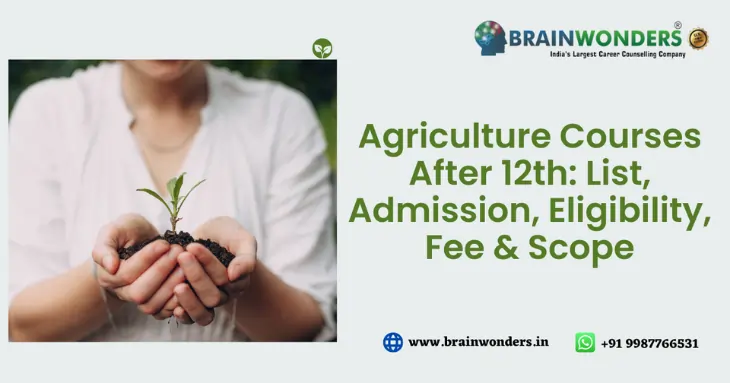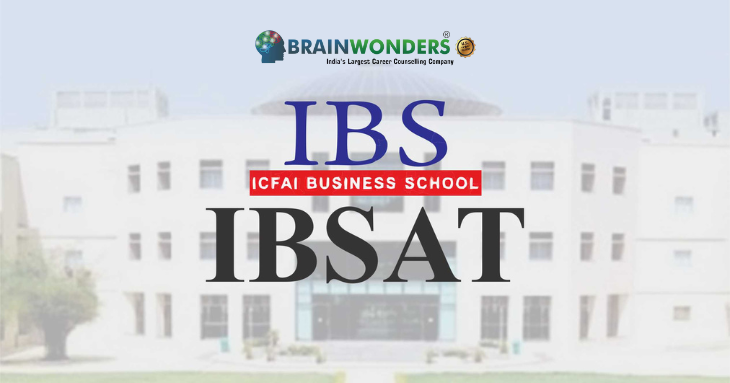

Take Brainwonders Career Test and make the right decisions for your college and course ahead
Let your unique personality, strengths, and traits guide to make the best decdision of your life!
Blog
17 February,2024 | By Brainwonders

Agricultural Courses After 12th: The field of agriculture has always held a special place in students' hearts. Approved universities receive many applications each year for admission to undergraduate courses in agriculture. These programs encompass various disciplines and involve the study of agriculture with the influence of science, technology, and engineering.
Students who have completed their 12th examination from a recognized board in India can apply for admission to agriculture programs such as BSc Agriculture, BSc Forestry, BSc Horticulture, B.Tech Agriculture Engineering, BSc Plant Science, and many more. The fees for these programs vary between INR 9,000 and INR 75,000 in private, central, state, and other universities.
How many years do Agriculture courses after the 12th last? Agriculture courses are offered at the undergraduate (UG), postgraduate (PG), PhD, diploma, postgraduate diploma (PG Diploma), and certificate levels. The duration of the UG course is three years, while the PG course lasts for two years. The duration of agriculture certificate and diploma courses ranges from six months to two years.
Some agricultural universities in India admit students based on the merit of their entrance exam performance. Upon completing the UG-level agriculture course, students can embark on their professional careers with a starting salary ranging from INR 3-6 LPA (Lakhs Per Annum). There are abundant job opportunities available in private, state, and central organizations for graduates of Agriculture courses.
The following points shed light on the reasons:
Agriculture courses teach students about utilizing technology to improve agricultural production and fundamental agricultural concepts. It encompasses various fields such as dairy, horticulture, plant science, food science, and food technology. Nowadays, many students with an engineering background are inclined towards pursuing Agricultural Engineering due to its strong reputation.
Upon completing their 12th or even 10th standard, students can apply for various Agriculture courses at different educational levels, including undergraduate and postgraduate programs. Nowadays, many agriculture institutes offer diploma and certificate courses in agriculture through online platforms.
Most students typically enrol in bachelor's degree programs immediately after completing their intermediate education. Within the expansive realm of agriculture, students can select from various specializations to gain expertise in their chosen field. Provided below is a list of agriculture courses available after 12th Grade:
| Course | Duration |
| BTech in Agricultural Science | 4 Years |
| BTech in Horticultural Science | 4 Years |
| BSc in Fisheries | 4 Years |
| BSc in Agricultural Economics and Farm Management | 3 to 4 Years |
| BSc Soil and Water Management | 3 to 4 Years |
| BSc Agriculture and Food Business | 3 to 4 Years |
| BSc in Animal Husbandry | 3 to 4 Years |
| BSc Agriculture | 3 to 4 Years |
| BSc in Forestry | 4 Years |
| BSc in Genetics Plant Breeding | 3 Years |
| BSc in Food Science and Nutrition | 3 Years |
| BSc in Horticulture | 3 Years |
| Diploma in Agriculture | 1 to 2 Years |
| Certificate in Agriculture | 6 Months to 1 Year |
BSc Students who have completed their 12th grade in the science stream and aspire to work in agriculture can apply for BSc Agriculture Courses after 12th Science. This course spans three years and covers various essential aspects of the field.
The BSc Agriculture Courses after 12th Science allow students to acquire knowledge about the practices and techniques required for pursuing a career in the agricultural domain.
Among the various options available, BSc Horticulture is the most popular course, requiring a minimum of three years to complete the degree. This program focuses on breeding vegetables, cereals, fruits, and decorative flowers. It consists of six semesters, providing a combination of theoretical and practical subjects.
Key Features of Agriculture Courses After 12th For aspiring candidates looking to pursue agriculture courses after completing their 12th grade, here are some essential features and requirements to consider:
IMTS institute offers admission to agricultural courses after 12th grade. The admission process is based on merit, considering the importance of the agricultural sector in India's economy. It is crucial to have a well-educated youth contributing to this sector's wise and efficient management. If students encounter difficulties during the admission process, our counselors are available to provide guidance and support.
The eligibility criteria for pursuing agricultural courses after 12th grade vary depending on the admission process. For merit-based admissions, students' eligibility is determined by their performance in the last examination. In the case of entrance-based admissions, students need to secure good marks in both their 12th standard examination and the entrance exam.
Several entrance exams are conducted for admission to agriculture courses. These include PAU CET, BCECE, JCECE, AP EAMCET, GCET, MAH CET, TS EAMCET, and ICAR AIEEA. These exams can be national, state-level, or institute-specific. Agricultural institutes admit students who have passed these national entrance exams.
| Course | Duration | Fee (Per Year) | Eligibility |
| BTech in Agriculture Science | 4 Years | Rs 95,000/- | Passed 12th with 55% marks in the PCM/B stream |
| BTech in Dairy Technology | 4 Years | Rs 87,000/- | |
| BSc in Agriculture | 3 Years | Rs 92,124/- | |
| BSc in Animal Husbandry | 3 Years | Rs 84,399/- | |
| BSc in Forestry | 4 Years | Rs 72,999/- | |
| Diploma in Agriculture | 1 Year to 2 Years | Rs 35,889/- | Class 10th or 12th Passed |
Opting for agriculture courses after the 12th in the Arts stream introduces various factors and techniques relevant to agriculture. Students who have completed their 12th grade in the arts stream can pursue admission in agriculture courses, as multiple specialized programs are available for them.
To be eligible for admission into most reputable institutions, students must achieve a minimum score of at least 55% in their 10+2 exams. Agriculture courses after 12th arts offer promising opportunities for applicants to enhance their knowledge and skills, leading to improved farming outcomes.
Agriculture courses offer avenues for students with a keen interest in agriculture to explore new and advanced techniques that contribute to the development of the field. Students who have completed their 12th grade in the Science stream can choose to pursue admission in various agriculture courses after 12th Science, such as:
| Course Name | Duration |
| BE/BTech Agriculture and Dairy Technology | 4 years |
| BE/BTech Dairy Technology | 4 years |
| BE/BTech Agricultural Engineering | 4 years |
| BE/BTech Agricultural Technology | 4 years |
| BE/BTech Agricultural and Food Engineering | 4 years |
| BSc Agricultural Biotechnology | 3 years |
| BSc Plant Science | 3 years |
| BSc Plant Pathology | 3 years |
| BSc Horticulture | 3 years |
| BSc Fisheries Science | 3 years |
| BSc Food Science | 3 years |
| BSc Dairy Science | 3 years |
| BSc Agriculture | 3 years |
| BSc Forestry | 3 years |
Agriculture Courses After 12th in Commerce Stream
There are limited options for agriculture courses after 12th Commerce, such as Diploma in Horticulture, floriculture courses, landscape gardening courses, and more. However, for bachelor's degree programs, students must have physics, chemistry, and biology as the main subjects in their 10+2 education. Admission to colleges in India is generally based on the student's performance in their 12th grade. Some universities also conduct entrance exams for admission.
A diploma in Agriculture is a 2-year program offered by various institutions to provide in-depth knowledge on various aspects of agriculture. Admission to diploma courses in agriculture after the 12th is generally based on the scores obtained in the qualifying exam, although some institutions also conduct entrance exams.
To be eligible for admission to these courses, students must have scored a minimum of 55% in their qualifying exam. The demand for professionals in the agriculture field has been increasing, driven by advancements in various sectors.
Agricultural education focuses on cultivation techniques, including studying cultivation methods, fertilization, and advanced technical tools. These courses are available for students after completing their intermediate studies. Agriculture is considered an essential part of survival in India, and educational courses have been designed in recent years to provide valuable career opportunities in the agricultural field.
Students in West Bengal who wish to pursue agriculture courses after the 12th can apply at IMTS Institute. Admission will be granted to eligible students. The eligibility criteria vary for different levels of agriculture courses. These courses are available at the undergraduate (UG), postgraduate (PG), diploma, and certificate levels in West Bengal.
Scope of Agriculture Courses After 12th Completing an agriculture degree opens up numerous career opportunities. Graduates can work as biochemists, food scientists, environmental engineers, agricultural operations managers, relationship managers, supervisors, and more.
Q1: What are some popular agriculture courses available after completing 12th grade?
Ans: Some popular agriculture courses available after completing 12th grade include BSc Agriculture, BSc Horticulture, BSc Forestry, B.Tech Agriculture Engineering, BSc Agricultural Biotechnology, and BSc Food Technology.
Q2: How can I secure admission in agriculture courses after 12th?
Ans: To secure admission in agriculture courses after 12th, you can apply directly to universities or institutes offering these courses. The admission process may involve merit-based selection or entrance exams. Check the specific requirements of the institutions you are interested in and follow their application procedures.
Q3: What are the eligibility criteria for agriculture courses after 12th?
Ans: The eligibility criteria for agriculture courses after 12th may vary depending on the specific course and institution. Generally, candidates should have completed their 12th grade from a recognized board with relevant subjects such as Physics, Chemistry, and Biology or Agriculture. Minimum aggregate marks or cutoff scores may also apply.
Q4: Are there any entrance exams for admission to agriculture courses after 12th?
Ans: Yes, there are entrance exams for admission to agriculture courses after 12th. Some common entrance exams include ICAR AIEEA (Indian Council of Agricultural Research All India Entrance Examination), PAU CET (Punjab Agricultural University Common Entrance Test), BCECE (Bihar Combined Entrance Competitive Examination), and TS EAMCET (Telangana State Engineering, Agriculture & Medical Common Entrance Test).
Q5: What is the fee structure for agriculture courses after 12th?
Ans: The fee structure for agriculture courses after 12th can vary depending on the university or institute. It may also depend on whether the institution is private or government-funded. Generally, the fees can range from INR 9,000 to INR 75,000 per year.
Q6: What is the scope of agriculture courses after 12th in terms of career opportunities?
Ans: The scope of agriculture courses after 12th is broad and offers diverse career opportunities. Graduates can work as agricultural scientists, agronomists, agricultural officers, crop consultants, agricultural engineers, food technologists, farm managers, horticulturists, and in various roles related to agribusiness, research, and development.
Q7: Are there any specialization options available in agriculture courses after 12th?
Ans: Yes, there are specialization options available in agriculture courses after 12th. Some common specializations include Agronomy, Horticulture, Plant Breeding and Genetics, Soil Science, Agricultural Engineering, Food Science and Technology, Agricultural Economics, and Agricultural Extension.
Q8: Can students from the arts or commerce stream pursue agriculture courses after 12th?
Ans: Yes, students from the arts or commerce stream can pursue agriculture courses after 12th. However, they may need to meet specific subject requirements and eligibility criteria set by the universities or institutes offering these courses.
Q9: What is the duration of undergraduate agriculture courses after 12th?
Ans: The duration of undergraduate agriculture courses after 12th is typically three to four years, depending on the specific course and university.
Q10: What are the job prospects for graduates of agriculture courses after 12th?
Ans: Graduates of agriculture courses after 12th have various job prospects. They can work in agricultural companies, government agricultural departments, research organizations, food processing industries, agribusiness firms, NGOs, and can also pursue entrepreneurship in farming or allied sectors.
Q11: Are there any diploma or certificate courses available in agriculture after 12th?
Ans: Yes, there are diploma and certificate courses available in agriculture after 12th. These short-term courses focus on specific skills and provide specialized knowledge in areas such as organic farming, horticulture, animal husbandry, floriculture, and farm management.
Q12: What are the top universities or institutes offering agriculture courses after 12th?
Ans: Some top universities or institutes offering agriculture courses after 12th include Indian Agricultural Research Institute (IARI), Punjab Agricultural University (PAU), Tamil Nadu Agricultural University (TNAU), Chaudhary Charan Singh Haryana Agricultural University (CCSHAU), and University of Agricultural Sciences (UAS), Bangalore.
Q13: What are the key skills required for success in agriculture courses after 12th?
Ans: Key skills required for success in agriculture courses after 12th include a strong understanding of agricultural principles, critical thinking, problem-solving abilities, good communication skills, analytical skills, technical knowledge, teamwork, adaptability, and a passion for sustainable agriculture practices.
Q14: Are there any scholarships or financial assistance available for students pursuing agriculture courses after 12th?
Ans: Yes, there are scholarships and financial assistance programs available for students pursuing agriculture courses after 12th. These can be offered by government organizations, universities, private foundations, and agricultural associations. Students can explore various scholarship opportunities based on their eligibility criteria.
Q15: Can I pursue postgraduate studies in agriculture after completing an undergraduate course after 12th?
Ans: Yes, after completing an undergraduate course in agriculture after 12th, you can pursue postgraduate studies in agriculture. Postgraduate programs include MSc in Agriculture, MSc in Horticulture, M.Tech in Agricultural Engineering, and other specialized courses. Admission requirements may vary, and candidates need to fulfill the eligibility criteria specified by the respective universities or institutes.
Q16: Is it possible to pursue Agriculture courses without Mathematics?
Ans: No, candidates are required to excel in Biology, Chemistry, and Physics. For UG programs, applicants need a minimum of 45% to 50% in Class 12 Science, and for PG courses, a bachelor's degree with a cumulative GPA of 45%–50% is mandatory.
Various Agriculture courses are available after Class 12 in reputed universities, and candidates can apply with an overall GPA of 40% to 45%. The duration of these courses varies, ranging from a few hours for certification courses to one year for a PhD, with undergraduate and postgraduate degrees taking 3-5 years and 2-3 years, respectively.
Q17: Is NEET mandatory for admission to agricultural courses?
Ans: For admission to BSc Agriculture, NEET is not required. The entrance tests necessary for eligibility include:
1. ICAR AIEEA (CUET) - All India Entrance Examination for Admission, Common Entrance Test (ICAR-UG) by the Indian Council of Agricultural Research (ICAR) for bachelor's degree programs in Agriculture and Allied Sciences.
2. KCET - Karnataka Common Entrance Test conducted by the Karnataka Examination Authority (KEA) for admission to professional programs.
3. AP EAPCET (AP EAMCET) - Andhra Pradesh Engineering Agricultural and Medical Common Entrance Test, formerly known as Andhra Pradesh EAMCET, now named Andhra Pradesh EAPCET.
Take Brainwonders Career Test and make the right decisions for your college and course ahead



,_Syllabus,_Pattern,_Old_Question_Papers.png)

